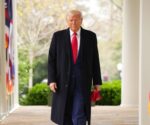Donald Trump’s tariffs could force government into emergency bailouts | Politics | News
Donald Trump’s tariffs blitz could force the Government to bail out crippled British industries. Sir Keir Starmer has not ruled out stepping in with emergency measures, similar to the financial crisis of 2008 and the Covid pandemic.
The Prime Minister said “all options remain on the table” and that he would put the “national interest” first. His remarks came as the US president prepared to unleash a global tsunami of punishing “Liberation Day” tariffs on Wednesday – despite Britain warning that a global trade war will trigger economic turbulence and make millions poorer. Mr Trump hosted a ceremony at the White House as he imposed sweeping levies on American-bound goods.
Downing Street has not ruled out emergency bailouts if industries are badly hit.
Speaking ahead of Mr Trump’s big announcement, the Prime Minister’s official spokesman said: “I’m not going to get ahead of the details about what’s being announced later – we will always act in the national interest.
“For instance, we have said in relation to the steel industry, the Government has got a £2.5billion commitment to rebuild the UK steel industry and support communities now and for the generations to come alongside a wide range of measures that support that important industry.”
Rachel Reeves has admitted the UK could still be hit by the impact of Mr Trump’s tariffs even if a quick “economic deal” can be struck with the US.
Sir Keir’s Government is prepared to offer concessions to the US in an attempt to reach a deal, which could mitigate the impact of the president’s levies.
But the Chancellor acknowledged the UK would not be “out of the woods” even if a deal could be reached with the White House because of the global economic storm the president’s measures would unleash.
The UK is not expected to immediately retaliate, with Ms Reeves insisting the Government would not be “posturing” in search of a “quick headline”.
Ms Reeves told the Commons Treasury Committee: “We don’t want to be posturing here, the prize on offer is a good economic agreement between us and the United States”.
“We are not going to do anything to put that in jeopardy, we are not going to rush into action to get a quick headline.”
She said the main impact on the British economy would be from “global tariffs” rather than UK-specific ones, thanks to depressed demand and higher inflation in other countries.
The European Union hit back with counter-tariffs during Mr Trump’s first White House term. Commission president Ursula von der Leyen said this week: “We do not necessarily want to retaliate, but we have a strong plan to retaliate if necessary.”
Ms Reeves said “let’s see how other countries and other trading blocs respond”, adding: “We are discussing with other countries and the EU about the appropriate response to whatever announcements are made later today.”
At Prime Minister’s Questions, Sir Keir said the Government has “prepared for all eventualities” and is working with companies likely to be hit by the tariffs.
He told MPs: “A trade war is in nobody’s interests and the country deserves – and we will take – a calm, pragmatic approach.
“That’s why constructive talks are progressing to agree a wider economic prosperity deal with the US.
“That’s why we’re working with all industries and sectors likely to be impacted.
“Our decisions will always be guided by our national interest, and that’s why we have prepared for all eventualities, and we will rule nothing out.”
The car industry has already learned its fate, with a 25% tariff on vehicles sent to the US – something which could cost an estimated 25,000 jobs in the UK.
The imposition of wider tariffs will make a range off British goods more expensive in the US, which is likely to reduce demand.
The UK could also becomes a destination for imports diverted from the US due to the high cost, potentially flooding the market and hitting domestic producers.
Economists at the Office for Budget Responsibility have warned that US tariffs could eliminate Ms Reeves’s “headroom” against her day-to-day spending plans, requiring her to make more cuts or hike taxes to meet the rules she has set herself.
The tariffs could knock up to 1% off the size of the UK economy if there is a full-blown trade war with the UK retaliating to Mr Trump’s measures.
Analysis from the Institute for Public Policy Research (IPPR) suggested tariffs on car imports would put 25,000 UK jobs at risk and “completely destabilise the UK car manufacturing industry”.
UK negotiators are pursuing an economic agreement with the US focused on technology.
Such a deal could include possible changes to the digital services tax – which imposes a 2% levy on the revenues of several major US tech companies – in exchange for a carve-out from the tariffs.
Sir Keir did not deny that changes to the digital services tax are being considered.
Easing access for US agricultural products to UK markets could also be on the table, although officials have insisted that food standards will not be lowered.
In the Commons, Tory leader Kemi Badenoch accused Sir Keir of taking decisions that have left the UK economy “fragile just as we face global trade wars”.









